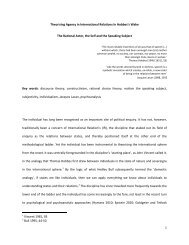biological sciences HONOURs 2014 - The University of Sydney
biological sciences HONOURs 2014 - The University of Sydney
biological sciences HONOURs 2014 - The University of Sydney
Create successful ePaper yourself
Turn your PDF publications into a flip-book with our unique Google optimized e-Paper software.
HUMAN NUTRITION<br />
AND EPIDEMIOLOGY<br />
43<br />
Research Interests<br />
In Australia, 3 out <strong>of</strong> 4 adults are overweight or obese, and<br />
1.7 billion individuals are obese worldwide. Alarmingly, obesity<br />
is highly associated with the development <strong>of</strong> metabolic<br />
complications including insulin resistance and type 2 diabetes.<br />
In order to address the obesity epidemic, we need to<br />
investigate the physiological mechanisms leading to obesity<br />
and its metabolic complications and provide effective, low-risk<br />
treatments for weight loss.<br />
My research investigates the physiological mechanisms leading<br />
to obesity and its metabolic complications and spans preclinical<br />
mouse models, to humans to epidemiological data-sets. By<br />
performing interventions resulting in weight gain (overfeeding<br />
studies) and weight loss (diet, exercise and weight loss<br />
surgery), my research investigates the associated changes<br />
in whole-body, adipose tissue and skeletal muscle physiology<br />
associated with obesity and diabetes.<br />
Honours projects<br />
1. Investigating the potential risks versus benefits <strong>of</strong><br />
weight loss surgery. Weight loss (bariatric) surgery results<br />
in a spectacular 30-40% weight loss and resolution <strong>of</strong> type 2<br />
Dr Charmaine Tam<br />
Room 322, Heydon-<br />
Laurence Building A08<br />
T: (02) 9036 6262<br />
E: charmaine.tam@<br />
sydney.edu.au<br />
diabetes in up to 80% <strong>of</strong> cases after one year. Despite such impressive outcomes, the potential<br />
risks <strong>of</strong> such procedures on parameters such as body composition and bone health are unknown.<br />
This project would involve learning how to run a clinical research study, interactions with<br />
patients, performing body composition scans, serum assays in the laboratory and data analysis.<br />
2. Examining the role <strong>of</strong> inflammation and matrix remodelling in fat tissue and skeletal<br />
muscle in the development <strong>of</strong> obesity and type 2 diabetes. Obesity is now recognised as a<br />
state <strong>of</strong> chronic low-grade inflammation in the adipose tissue and potentially skeletal muscle.<br />
This project would involve learning a range <strong>of</strong> molecular biology techniques for analysing adipose<br />
tissue and skeletal muscle in mouse models <strong>of</strong> obesity and diabetes.
















